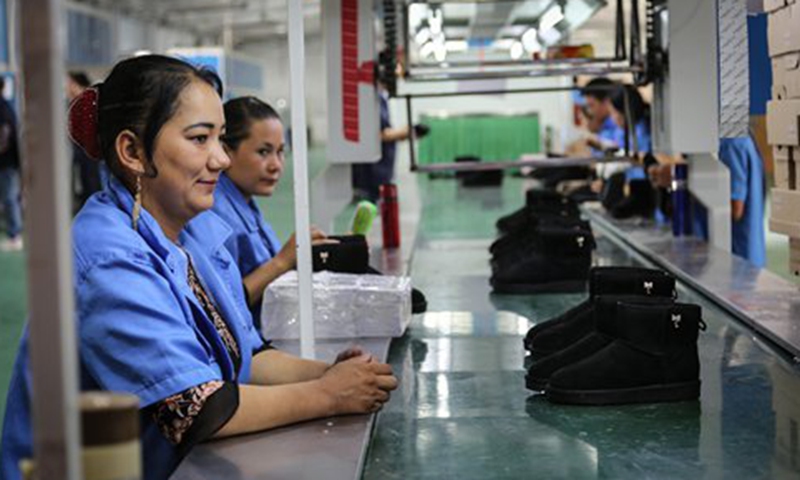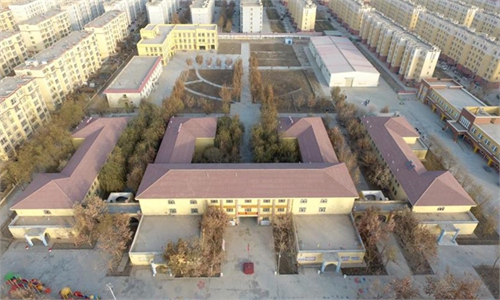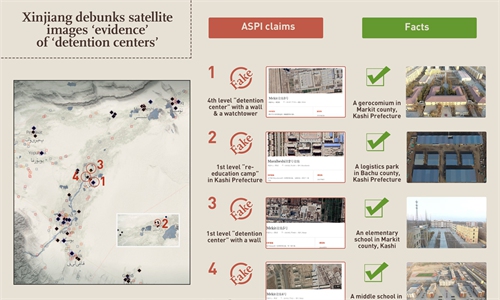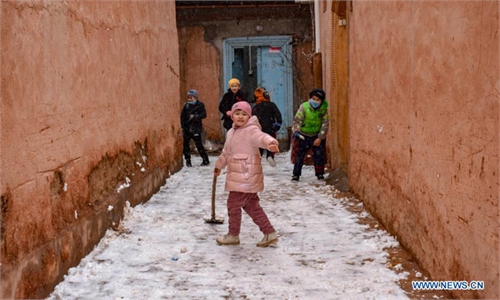Officials reject West’s slander of labor, religion in Xinjiang at rare press conference in Beijing

Local workers busy working at a shoe-making production line in Hotan, Northwest China's Xinjiang Uyghur Autonomous Region. Photo: Chen Qingqing/GT
At a rare press conference held in Beijing on Monday, Xinjiang regional government officials and ordinary citizens were bombarded with a flurry of tough questions from foreign media outlets over so-called "forced labor" and "re-education camps." They answered with facts, statistics and personal stories.
With the participation of more than a dozen foreign media outlets from various countries including the US, France, Egypt, Bangladesh and Russia, the deputy director-general of the CPC Publicity Department of Xinjiang Uygur Autonomous Region Xu Guixiang, the spokesperson of the Xinjiang regional government Elijan Anayat, and five local citizens took questions at Monday's press conference on Xinjiang-related issues at China's foreign ministry.
Many of the questions clichéd rumors that have been circulating for a while in the Western media. Such as, is there any "forced labor" in Xinjiang? Does the government detain more than 1 million Uygurs in "re-education camps?"
"In recent years, some anti-China forces, media and think tanks as well as some politicians smeared China's policies in Xinjiang, sowed discord among different ethnic groups, and sabotaged stability to hinder the region's development. People in Xinjiang strongly condemned such behavior," said Xu.
"Xinjiang-related issues are not issues of ethnic groups, religion or human rights. The issues are anti-terrorism and de-radicalization. For those who smear and pour dirty water to Xinjiang, we will not retreat," Xu said.
In response to questions regarding "forced labor" in the cotton and textile industries, hyped by Western media, Xu slammed such claims as "ridiculous."
"What they are doing is using 'human rights' to abuse Uygur people's labor rights and take away their right to have a happy life through work," he added.
The natural conditions in Xinjiang are suitable for growing cotton. In the past, the degree of mechanization was not high and it required a great deal of human labor during the cotton-picking season. Many people even traveled from other provinces to pick cotton because they could make more than 10,000 yuan ($1,529) in about a month during the busiest season, according to Xu.
Responding to the question as to whether Uygur people are underpaid, both officials and local citizens refuted it with facts. Global Times also run an article recently to debunk rumors of the "forced labor" in cotton industry fabricated by the infamous anti-China "scholar" Adrian Zenz with statistics.
Shirali Mamtmin, who works at a clothing factory in Yili Prefecture with his wife, told the media that he likes his job very much and he makes more money than most of his colleagues, including those of Han ethnicity, due to his hard work. He and his wife have saved more than 100,000 yuan and he wants to start a business in the future.
As for the question of protection of religious freedom, a resident from Hotan named Obulhasan Tursunniyaz told Monday's press conference that people enjoy religious freedom and the mosque in his hometown is well-equipped. Religious activities at the mosque were not influenced much during the COVID-19 epidemic.
"Cameras set up in mosques are aimed at protecting safety and preventing, cracking down on terrorist activities. We firmly support it and we enjoy freedom of religious belief," Obulhasan said.
Obulhasan told the media that there are four ways to acquire religious knowledge. The first is to study at mosques, where there are religious staff as teachers. The second is to study at religious institutions and the third is to learn through reading, while the fourth is to learn via magazines and online resources.
An organization behind many Xinjiang-related lies is the Australian Strategic Policy Institute (ASPI), which has gained notoriety for its fake reports.
The ASPI's work is orchestrated by the US government. It receives funds from the US government and pioneers anti-China rhetoric. Its so-called "report" claiming that Xinjiang is building a larger "re-education camp" is ridiculous, Elijan said.
All trainees at vocational education and training centers have graduated. Some pursue further studies, some work with companies, and others have started their own businesses. Their rights are protected in accordance with the laws while they are making money for a good life, the official said.




